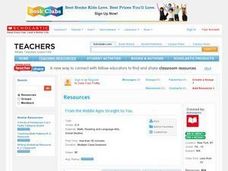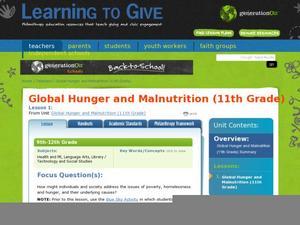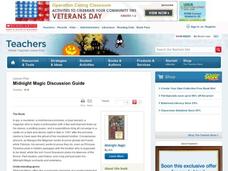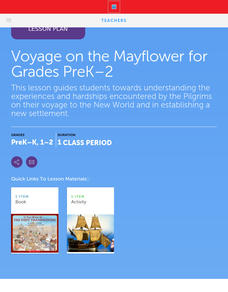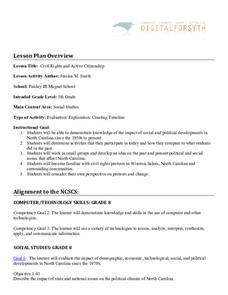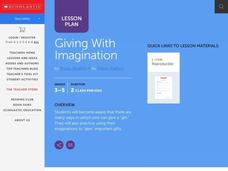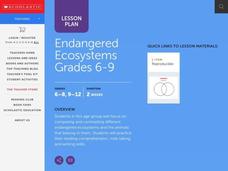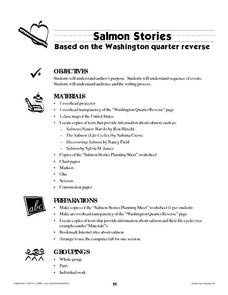EngageNY
Properties of Dilations
Investigate dilations to learn more about them. The second segment in a series of 16 provides a discussion of properties of dilations by going through examples. The problem set provides opportunities for scholars to construct dilations.
Curated OER
From the Middle Ages Straight to You
Students read a "letter" from Dr. Suess' Bartholomew Cubbins and note differences between their lives and Bartholomew's. They utilize prewriting strategies to draft a letter of response to Bartholomew.
Curated OER
Global Hunger and Malnutrition
Is there a difference between hunger and malnutrtion? Is this a problem only in third world countries? How does hunger and malnutrition affect the community? Why do these problems exist when the world produces enough food to feed...
Scholastic
Midnight Magic Discussion Guide
This discussion guide accompanies the fiction book Midnight Magic written by Avi, enforces story elements, inferences, and theme/plot. Have the class work on it over time, it will engage even your reluctant readers.
EngageNY
Linear and Nonlinear Expressions in x
Linear or not linear — that is the question. The lesson plan has class members translate descriptions into algebraic expressions. They take the written expressions and determine whether they are linear or nonlinear based upon the...
EngageNY
Ratios of Fractions and Their Unit Rates 2
Remodeling projects require more than just a good design — they involve complex fractions, too. To determine whether a tiling project will fit within a given budget pupils calculate the square footage to determine the number of...
EngageNY
Changing Scales
Pupils determine scale factors from one figure to another and the scale factor in the reverse direction. Scholars compute the percent changes between three figures.
EngageNY
Mixture Problems
What percent of the mixture is juice? Pairs use their knowledge of proportions to determine what percent a mixture is juice given the percent of juice in the components. Pupils use the procedure learned with the juice mixture problem to...
EngageNY
Ratios II
Pupils continue the study of ratios by creating ratios from a context. The contexts present more than two quantities, and scholars create contexts that match given ratios.
EngageNY
Interpreting Division of a Whole Number by a Fraction—Visual Models
Connect division with multiplication through the use of models. Groups solve problems involving the division of a whole number by a fraction using models. The groups share their methods along with the corresponding division and...
Scholastic
Voyage on the Mayflower
After completing an online activity about the Mayflower, scholars draw a picture about what they know of the Thanksgiving holiday, including a one-sentence summary. A reading of If You Were at the First Thanksgiving by Anne Kamma is...
Curated OER
Describing Paintings: Calm or Stormy
Young writers use nouns, verbs, and adjectives to describe details in two paintings. One depicts a sunny landscape, and the other shows a cloudier view. They write a narrative inspired by the paintings, paying attention to transitional...
Curated OER
How to Make a Lake
Delve in the creation of the Great Lakes in Michigan. After listening to stories about the formation of the lakes in this area, pupils perform experiments to investigate how this occurred. This provides a great way for learners to...
Curated OER
Homework Contract
Establish strong study habits from the beginning of the year with a contract that details good practices for completing homework. Parents and kids decide how many minutes a night should be devoted to study, and for how many weeks the...
Random House
Mapping Skills
Spark interest and enhance your pupils' map skills using Matteo Pericoli's book, See the City: the Journey of Manhattan Unfurled. Through Pericoli's illustrations and text, learners explore the East and West...
Digital Forsyth
Civil Rights and Active Citizenship
As part of a study of the American Civil Rights movement, class members search the Internet to find important facts, people, events, and pictures that they use to create a timeline of events between 1955 and 1970.
Scholastic
Writing Letters of Gratitude
A lesson plan begins with a discussion on gratitude—what does it mean, and for who are learners thankful? Scholars share their thoughts and feelings then choose a community worker to which they wish to share their gratitude. Writers...
Curated OER
Comparing Values: Comparisons Between Musical Notation and Money
Students identify ways in which the principles and subject matter of other disciplines taught in school, specifically math, are interrelated with those of music.
Curated OER
Wagons West!
The first pioneers faced many obstacles on their journey west. Middle schoolers read different historical fiction texts (ideas are provided), make connections, and complete a detailed packet (included). Reading guides, journal ideas, and...
Curated OER
Giving with Imagination
Demonstrate gift giving as an act of caring about someone versus gifts for show (or gifts from the purse). Elementary learners practice giving gifts from the heart by creating a poem for someone special to them.
Curated OER
Studying STI/HIV
Eighth graders describe symptoms, effects, treatments, and prevention for chlamydia, HPV, herpes, gonorrhea, Hepatitis B and C, and HIV. They begin by answering provided background questions and get one's feelings about what they think...
Curated OER
Endangered Ecosystems
Reading comprehension and note-taking skills are practiced as young ecologists embark on this journey. Explorers visit a website where they will read about three ecosystems that are in danger. They use interactive programs to build a...
Curated OER
Salmon Stories
Work on author's purpose with this instructional activity, which focuses on sequence of events and audience as well. Middle and high schoolers describe the 50 State Quarters Program for background information. After discussing the...
Curated OER
How Many Letters Are In Your Name?
Students discover how to make a graph that represents the number of letters in their names. For this early childhood math lesson plan, students collect data, categorize data, and develop skills to analyze the pieces of data.



